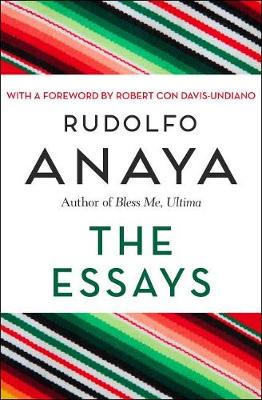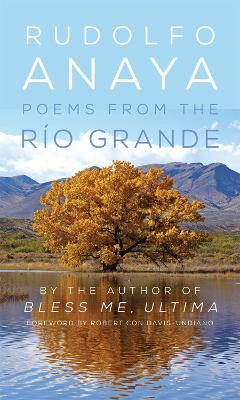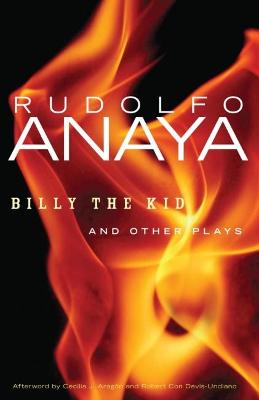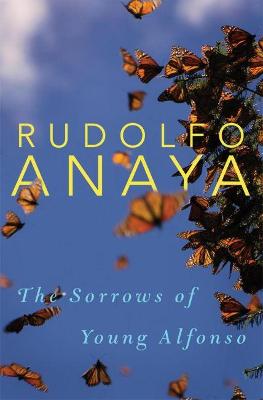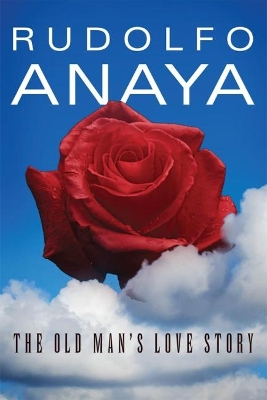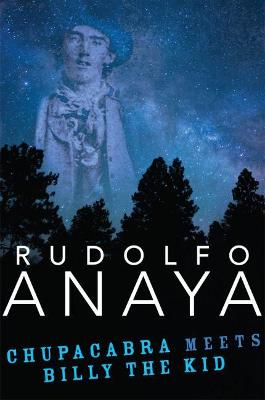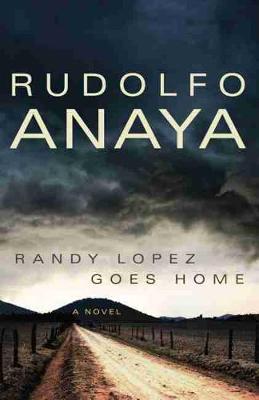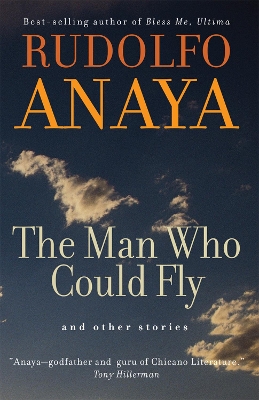Chicana and Chicano Visions of the Americas
8 total works
Collected here are Anaya's published essays. Despite his wide acclaim as the founder of Chicano literature, no previous volume has attempted to gather Anaya's nonfiction into one edition. A companion to The Man Who Could Fly and Other Stories, the collection of Anaya's short stories, The Essays is an essential anthology for followers of Anaya and those interested in Chicano literature.
Pieces such as ""Requiem for a Lowrider,"" ""La Llorona, El Kookooee, and Sexuality,"" and ""An American Chicano in King Arthur's Court"" take the reader from the llano of eastern New Mexico, where Anaya grew up, to the barrios of Albuquerque, and from the devastating diving accident that nearly ended his life at sixteen to the career he has made as an author and teacher. The point is not autobiography, although a life story is told, nor is it advocacy, although Anaya argues persuasively for cultural change. Instead, the author provides shrewd commentary on modern America in all its complexity. All the while, he employs the elegant, poetic voice and the interweaving of myth and folklore that inspire his fiction. ""Stories reveal our human nature and thus become powerful tools for insight and revelation,"" writes Anaya. This collection of prose offers abundant new insight and revelation.
Although the poems gathered here take a variety of forms - haiku, elegy, epic - all are imbued with the same lyrical and satirical styles that underlie Anaya's fiction. Together they make a fascinating complement to the novels, stories, and plays for which he is well known. In verse, Anaya explores every aspect of Chicano identity, beginning with memories of his childhood in a small New Mexico village and ending with mature reflections on being a Chicano who considers himself connected to all peoples. The collection articulates the themes at the heart of all Anaya's work: nostalgia for the landscape and customs of his boyhood in rural New Mexico, a deep connection to the Río Grande, the politics of Chicanismo and satire aimed at it, and the use of myth and history as metaphor.
Anaya also illustrates his familiarity with world traditions of poetry, invoking Walt Whitman, Homer, and the Bible. The poem to Isis that concludes the collection honors Anaya's wife, Patricia, and reflects his increasing identification with spiritual traditions across the globe.
Both profeta and vato, seer and homeboy, Anaya as author is a citizen of the world. Poems from the Río Grande offers readers a glimpse into his development as a poet and as one of the most celebrated Chicano authors of our time.
Did she stamp those words into his destiny?
The story of Alfonso, a Nuevo Mexicano, begins with his birth, when the curandera Agapita delivers these haunting words into his infant ear. What then unfolds is an elegiac song to the llanos of New Mexico where Alfonso comes of age. As this exquisite novel charts Alfonso's life journey from childhood through his education and evolution as a writer, renowned Chicano author Rudolfo Anaya invites readers to reflect on the truths and mysteries of the human condition.
Because Alfonso ""didn't write his own biography,"" it falls to his childhood friend, the anonymous narrator here, to tell his story, through a series of letters addressed to a mysterious figure named K. The narrator depicts young Alfonso caught between dual influences: his beloved, devout Catholic mother, Rafaelita, and the folk healer Agapita. After suffering a terrible accident that leaves him physically handicapped, Alfonso faces intellectual crises during his university years, all of which move him down the path of his destiny.
In describing these events, the ""old man"" writing the letters interweaves Alfonso's experiences with fragments of his own life and of the New Mexican llano that both men have called home. The trajectory of Alfonso's life in turn mirrors the history of New Mexico and the turbulent beginnings of the Chicano movement in which the young protagonist plays a trailblazing role.
As story builds upon story, the commonality of traits among the narrator, his subject, and perhaps Anaya himself appears more than coincidental. Permeated by Anaya's trademark religious and mythological imagery, The Sorrows of Young Alfonso is a luminous meditation on memory, reality, and the human experience.
An elegy not just for the dead but for the vitality of youth, the old man's story captures both the heartaches and ironies of old age. We follow him as he proceeds through days of grief and memory, buying his few groceries, driving slower than the other travelers on the road. He talks with his wife along the way. ""Go slow,"" he hears her admonish. As he sits in the garden with their dogs, he senses her worry over his loneliness. A year passes. He longs to care for someone, but - to love again?
Like characters in Anaya's previous fiction, the old man lives in a real New Mexico, but one inhabited by spirits. Death provides a gateway to other worlds, just as memories connect him to other times and places. When he eventually begins a new friendship with a woman, a widow, they share a bittersweet understanding of joy mixed with sorrow, promise mixed with loss.
Anaya's reflections, as shared through the experiences of this old man, point to the power and importance of love at every stage of life. Lyrical and earthy, sad yet suffused with humor, The Old Man's Love Story will speak to all readers, perhaps especially to those who have suffered a recent loss.
As she travels in time, Rosa passes into an alternative reality inhabited by extraordinary creatures, including shapeshifters, extraterrestrials, Bigfoot, and ChupaCabra. Readers familiar with Anaya's previous ChupaCabra mysteries will remember the heroine's earlier dealings with the elusive monster, a frightening creature of Hispanic folklore. But new dangers are also lurking for Rosa in the land of her ancestors, as a secret group of scientists known as C-Force threatens to clone ChupaCabra to create an army that will rule the world. As she encounters the Nuevomexicana women whose families suffered during the Lincoln County conflict, Rosa finds new reasons to fear the ChupaCabra - and to fight against the forces that threaten to shake the county to its core.
With her laptop computer in her saddlebag, Rosa rides into the Lincoln County War and accompanies Bilito on his last ride. By the end, her very soul is transformed, as she realizes that the same evil forces that propelled the violence along the Pecos River are much more resilient than she had hoped. In the finest tradition of magical realism and historical fiction, Anaya invites us to consider the ways that the supernatural reveals the realities of the past - and of our own times.
Randy's entry into the haunted canyon that leads to his ancestral home begins on the Day of the Dead. Reuniting with his padrinos--his godparents--and hoping to meet up with his lost love, Sofia, Randy encounters a series of spirits: coyotes, cowboys, Death, and the devil. Each one engages him in a conversation about life. It is Randy's old teacher Miss Libriana who suggests his new purpose. She gives him a book, How to Build a Bridge. Only the bridge--which is both literal and figurative, like everything else in this story--can enable Randy to complete his journey.
Readers acquainted with Anaya's fiction will find themselves in familiar territory here. Randy Lopez, like all Anaya's protagonists, is on a spiritual quest. But both those new to and familiar with Anaya will recognize this philosophical meditation as part of a long literary tradition going back to Homer, Dante, and the Bible. Richly allusive and uniquely witty, Randy Lopez Goes Home presents man's quest for meaning in a touching, thought-provoking narrative that will resound with young adults and mature readers alike.
Considered by many to be the founder of modern Chicano literature, Rudolfo Anaya, best known for Bless Me, Ultima and other novels, has also authored a number of remarkable short stories. Now for the first time, these stories, representing thirty years of Anaya's writing, have been collected into a single volume. They constitute the best and most essential collection of Anaya's short story work.
Unlike his novels, which range broadly over the American tapestry, Anaya's short stories focus on character and ethical questions in a regional setting - from the harsh deserts of the American Southwest and northern Mexico to the lush tropical forests of Uxmal in the YucatÁn. These tales demonstrate Anaya's singular attitude toward fiction: that stories create myths to live and love by. "In the end the story has to speak for itself," Anaya writes. "Its purpose can be studied, but never fully known."
With The Man Who Could Fly and Other Stories, the reader ventures deeply into the world of Rudolfo Anaya, a world of magic, mystery, harsh realities, and redemption.
